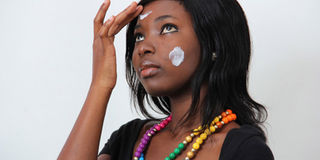Crackdown fail? Banned cosmetics trade still thriving

Sellers at the downtown beauty shops bypass controls to sell hazardous illegal cosmetics. PHOTO | FILE | NATION MEDIA GROUP
What you need to know:
- The sellers at the downtown beauty shops, fully aware that there's still demand for the banned products, are careful not to display them on shelves.
- Instead, they use women at the entrance of buildings to sell the illegal creams.
River Road. A street that is ever bustling with lots of activity and booming businesses. Along this busy passage in Nairobi’s downtown area, the street is dotted with tens of cosmetics shops.
Due to increased competition for customers, some stalls have their salespeople stand along corridors to waylay passers-by to purchase cosmetics from their beauty shops with promises of ''bei poa'' (good prices).
However, the Nation has learnt that there is also another reason the women are strategically positioned along corridors and not out in the open.
In 2009, the Kenya Bureau of Standards (Kebs) cracked the whip on the local beauty retail industry and banned various skin lightening creams, gels, lotions and soaps for containing harmful chemicals such as hydroquinone and mercury.
Some of the creams on the Kebs ban list include Peau Claire Beauty Body Lotion, Caro light, Amira Skin Lightening Lotion and Skin Balance Lemon Cream among others.
The sellers at the downtown beauty shops, fully aware that there's still demand for the banned products, are careful not to display them on shelves. Instead, they use these women at the entrance of buildings to sell the illegal creams.
When the Nation visited various stalls posing as buyers, the sellers eyed us suspiciously then said that whatever we wanted was not sold in the Kenyan market, and stressed that this has been the case for many years.
WAIT OUTSIDE
However, when we engaged one of the women calling out potential customers, she said that we could get products like Peau Claire, a skin lightening cream and one of the banned products containing mercury.
However, the condition was that we wait outside, a few metres from the entrance of Mombasa Rest House, the building where several of the cosmetic shops are based.
Before she leaves, she asks for the quantity and size required, assuring us that we could get even 100 pieces if we wanted. We settle for one, 150ml at Sh250.
To ensure that we don’t follow her, she walks off to fetch the product and looks back several times to keep her eyes on us.
The product, which we only purchased for investigative purposes, promises to give you young and radiant skin as well as a lighter complexion and smoother skin.
However, you are required to not expose yourself to sunlight or use it to colour eyelashes and eyebrows. The cream has no KEBS sticker. Its country of origin is listed as Côte d’Ivoire.
ILLEGAL TRADE
A decade and counting since the ban was effected, the hazardous products clearly still find their way into the Kenyan market and into the hands of women who are in pursuit of a lighter complexion.
A 2018 inter-agency crackdown on Nairobi’s grey economy that targeted contraband goods and trade in illegal imports hit traders hard. The operation, which lasted months, slowed down circulation of cash in downtown Nairobi as small traders' goods were held up at ports of entry for months at a time.
It is not yet clear how hard the exercise hit traders of counterfeit cosmetics or if it had any long-term impact on the trade. However, nearly two years since the operation, it seems to be business as usual on River Road.
Aside from skin lightening creams, trade in counterfeit beauty products thrives in downtown Nairobi.
For instance, while original M·A·C-branded lipstick will cost you not less than Sh2,000 at standard retail shops, you are likely to find fake ones at downtown stalls at only Sh200.
The story is the same for products made by popular global makeup brands such as Kylie and Huda Beauty.
According to a past trade global survey, M·A·C Cosmetics is one of the world's most counterfeited make-up brands.
Unlike fake bags and shoes, illegal cosmetics are especially dangerous as their chemical composition is untested and can have adverse reactions on the user's body.





